
Web application and API security are front and center as they are identified as a leading cause of data breaches and analyst firms continue to identify APIs as a top threat vector. The growth in DevOps, scalability in exchanging data with partners, and increasing usage of open-source software by organizations are key drivers in the reliance of applications and thus a growth in cyber risk. FortifyData identifies public and private application security risks within your organization and prioritizes them so you can address them quickly.
What is Application Security
Application security refers to the measures and practices implemented to protect software applications from security vulnerabilities and attacks. It involves identifying and mitigating potential security risks and ensuring that applications are designed, developed, and deployed with security in mind.

Application security risks refer to vulnerabilities and threats that can compromise the confidentiality, integrity, and availability of an application. These risks can result in unauthorized access, data breaches, information leakage, financial loss, or damage to the reputation of individuals or organizations. Here are some common application security risks:
- Injection Attacks: These occur when untrusted data is sent to an interpreter as part of a command or query. SQL injection and cross-site scripting (XSS) are common examples, where an attacker can manipulate the input to execute arbitrary commands or inject malicious code.
- Cross-Site Scripting (XSS): XSS vulnerabilities allow attackers to inject malicious scripts into web pages viewed by users. These scripts can be used to steal sensitive information, hijack user sessions, or deface websites.
- Cross-Site Request Forgery (CSRF): CSRF attacks trick authenticated users into performing unwanted actions without their knowledge. Attackers exploit the trust placed in a website by forging requests that appear legitimate, leading to actions like fund transfers, data modification, or account takeover.
- Broken Authentication and Session Management: Weak authentication mechanisms, improper session management, or ineffective password management can lead to unauthorized access to user accounts, session hijacking, or brute-force attacks.
- Security Misconfigurations: Poorly configured systems, frameworks, or applications can expose sensitive data or provide unnecessary access to attackers. This includes default configurations, unpatched vulnerabilities, open ports, and unnecessary services.
- Insecure Direct Object References: When applications expose internal implementation details or use user-supplied parameters to access objects directly, it may lead to unauthorized access to sensitive data or actions.
- Insecure Deserialization: Deserialization vulnerabilities can be exploited to execute arbitrary code, perform injection attacks, or tamper with serialized objects, potentially leading to remote code execution or privilege escalation.
- Security Flaws in Components and Libraries: Using outdated or vulnerable components or libraries within an application can introduce security weaknesses that attackers can exploit.
- Insufficient Logging and Monitoring: Inadequate or ineffective logging and monitoring mechanisms make it difficult to detect security incidents, identify attack patterns, or investigate breaches promptly.
- Social Engineering Attacks: While not limited to application security, social engineering techniques like phishing, pretexting, or baiting can manipulate users into divulging sensitive information or performing actions that compromise security.
To mitigate these risks, organizations should adopt secure coding practices, conduct regular security assessments and penetration testing, implement strong authentication and access controls, keep software and libraries updated, and educate users about security best practices.
How can Nanjgel Help?
Nanjgel is Partnered with one of the Best Cyber Security Vendor who identifies public and private application security risks within your organization and prioritizes them so you can address them quickly. For More Information, write to: sales@nanjgel.com




